超过三张表禁止join
1|0一、 问题提出
《阿里巴巴JAVA开发手册》里面写超过三张表禁止join,这是为什么?
2|0二、问题分析
对这个结论,你是否有怀疑呢?也不知道是哪位先哲说的不要人云亦云,今天我设计sql,来验证这个结论。(实验没有从代码角度分析,目前达不到。可以把mysql当一个黑盒,使用角度来验证这个结论) 验证结论的时候,会有很多发现,各位往后看。
3|0三、 实验环境
vmware10+centos7.4+mysql5.7.22 ,centos7内存4.5G,4核,50G硬盘。mysql配置为2G,特别说明硬盘是SSD。
4|0四、先概述下实验
有4张表,student学生表,teacher老师表,course课程表,sc中间关系表,记录了学生选修课程以及分数。具体sql脚本,看文章结尾,我附上。中间我自己写了造数据的脚本,也在结尾。
实验是为解决一个问题的:查询选修“tname553”老师所授课程的学生中,成绩最高的学生姓名及其成绩 。查询sql是:
我来分析一下这个语句:4张表等值join,还有一个子查询。算是比较简单的sql语句了(相比ERP动就10张表的哦,已经很简单了)。我 还会分解这个语句成3个简单的sql:
我来分析下:第一句,就是查询最高分,得到最高分590分。第二句就是查询出最高分的学生id,得到
。第三句就是查询出学生名字和分数。这样这3个语句的就可以查询出来 成绩最高的学生姓名及其成绩 。
接下来我会分别造数据:1千万选课记录(一个学生选修2门课),造500万学生,100万老师(一个老师带5个学生,挺高端的吧),1000门课,。用上面查询语句查询。其中sc表我测试了下有索引和没有索引情况,具体见下表。再接下来,我会造1亿选课记录(一个学生选修2门课),5000万学生,1000万老师,1000门课。然后分别执行上述语句。最后我会在oracle数据库上执行上述语句。
5|0五、下面两张表是测试结果
6|0六、仔细看上表,可以发现?
- 步骤3.1没有在连接键上加索引,查询很慢,说明:“多表关联查询时,保证被关联的字段需要有索引”;
- 步骤6.1,6.2,6.3,换成简单sql,在数据量1亿以上, 查询时间还能勉强接受。此时说明mysql查询有些吃力了,但是仍然嫩查询出来。
- 步骤5.1,mysql查询不出来,4表连接,对我本机mysql来说,1.5亿数据超过极限了(我调优过这个SQL,执行计划和索引都走了,没有问题,show profile显示在sending data.这个问题另外文章详谈。)
4.对比1.1 和5.1 步骤sql查询,4表连接,对我本机mysql来说 ,1.5千万数据查询很流利,是一个mysql数据量流利分水岭。(这个只是现象,不太准确,需要同时计算表的容量)。
5.步骤5.1对比6.1,6.2,6.3,多表join对mysql来说,处理有些吃力。
6.超过三张表禁止join,这个规则是针对mysql来说的。后续会看到我用同样机器,同样数据量,同样内存,可以完美计算 1.5亿数据量join。针对这样一个规则,对开发来说 ,需要把一些逻辑放到应用层去查询。
总结:这个规则 超过三张表禁止join ,由于数据量太大的时候,mysql根本查询不出来,导致阿里出了这样一个规定。(其实如果表数据量少,10张表也不成问题,你自己可以试试)而我们公司支付系统朝着大规模高并发目标设计的,所以,遵循这个规定。在业务层面来讲,写简单sql,把更多逻辑放到应用层,我的需求我会更了解,在应用层实现特定的join也容易得多。
7|0七、让我们来看看oracle数据库的优秀表现
看步骤7.1,就是没有索引,join表很多的情况下,oracle仍然26秒查询出结果来。所以我会说mysql的join很弱。那么问题来了,为什么现在使用很多人使用mysql呢?这是另外一个问题,我会另外说下我的思考。
看完本篇文章,另外我还附加赠送,所谓搂草打兔子。就是快速造数据。你可以自己先写脚本造数据,看看我是怎么造数据的,就知道我的技巧了。
8|0八、附上部分截图
附上sql语句和造数据脚本
如果您正在学习Spring Boot,推荐一个连载多年还在继续更新的免费教程:http://blog.didispace.com/spring-boot-learning-2x/
__EOF__

本文链接:https://www.cnblogs.com/satire/p/15307407.html
关于博主:评论和私信会在第一时间回复。或者直接私信我。
版权声明:本博客所有文章除特别声明外,均采用 BY-NC-SA 许可协议。转载请注明出处!
声援博主:如果您觉得文章对您有帮助,可以点击文章右下角【推荐】一下。您的鼓励是博主的最大动力!


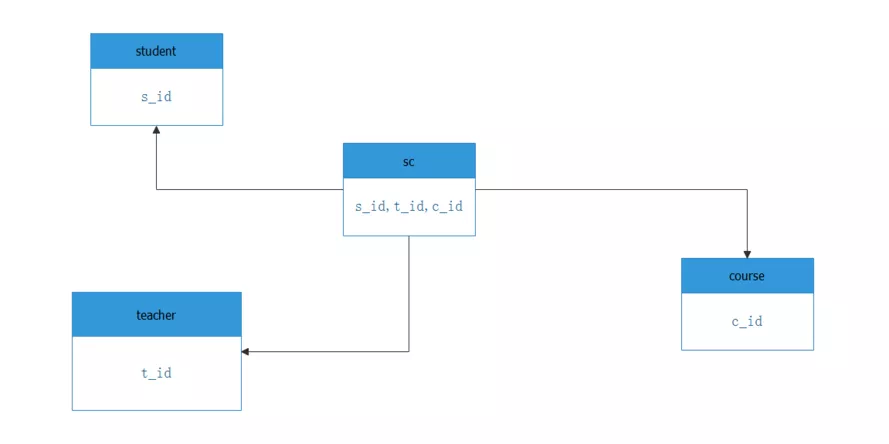
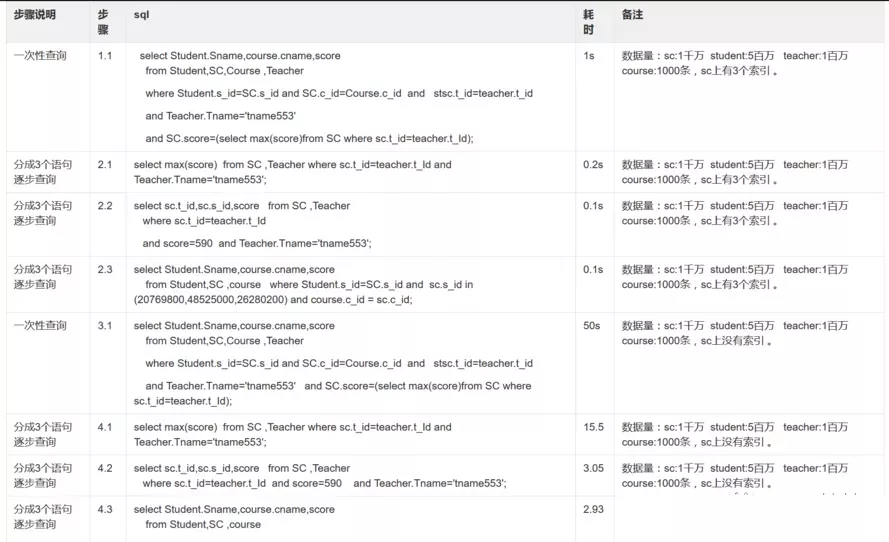
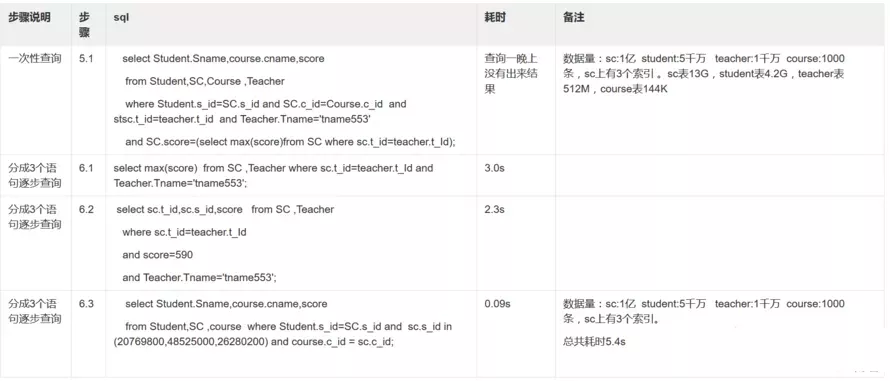
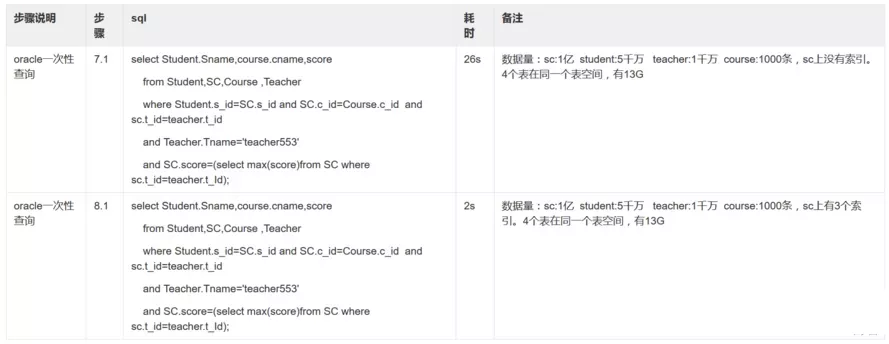

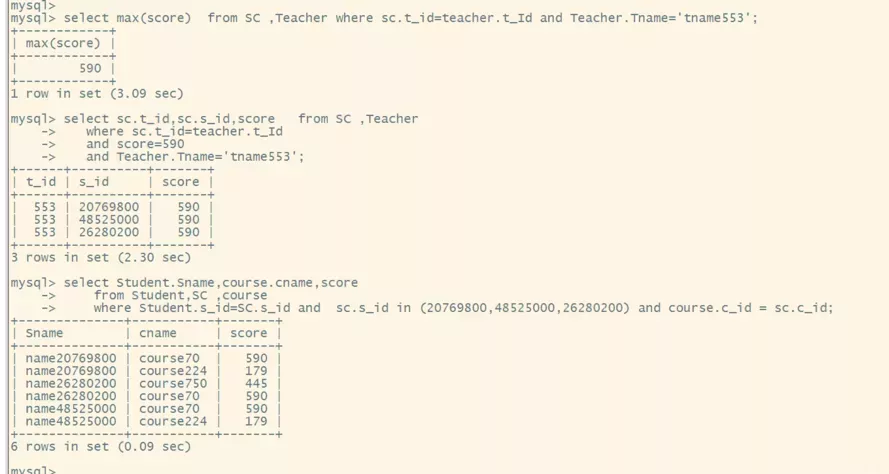
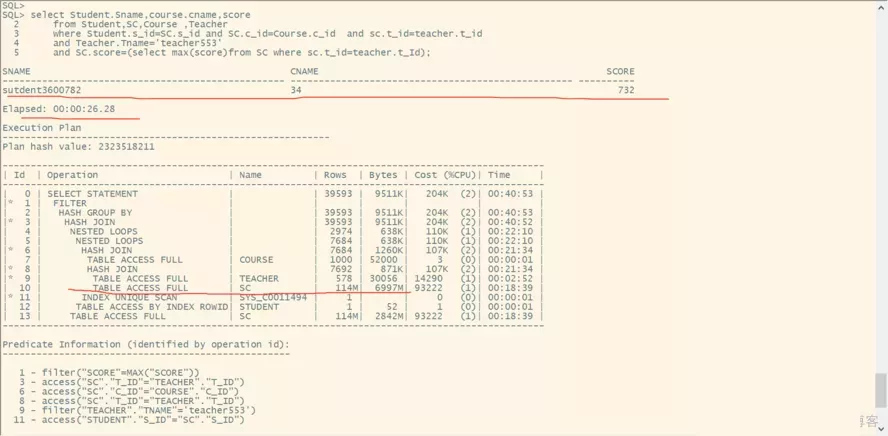


【推荐】国内首个AI IDE,深度理解中文开发场景,立即下载体验Trae
【推荐】编程新体验,更懂你的AI,立即体验豆包MarsCode编程助手
【推荐】抖音旗下AI助手豆包,你的智能百科全书,全免费不限次数
【推荐】轻量又高性能的 SSH 工具 IShell:AI 加持,快人一步
· AI与.NET技术实操系列:基于图像分类模型对图像进行分类
· go语言实现终端里的倒计时
· 如何编写易于单元测试的代码
· 10年+ .NET Coder 心语,封装的思维:从隐藏、稳定开始理解其本质意义
· .NET Core 中如何实现缓存的预热?
· 25岁的心里话
· 闲置电脑爆改个人服务器(超详细) #公网映射 #Vmware虚拟网络编辑器
· 基于 Docker 搭建 FRP 内网穿透开源项目(很简单哒)
· 零经验选手,Compose 一天开发一款小游戏!
· 一起来玩mcp_server_sqlite,让AI帮你做增删改查!!